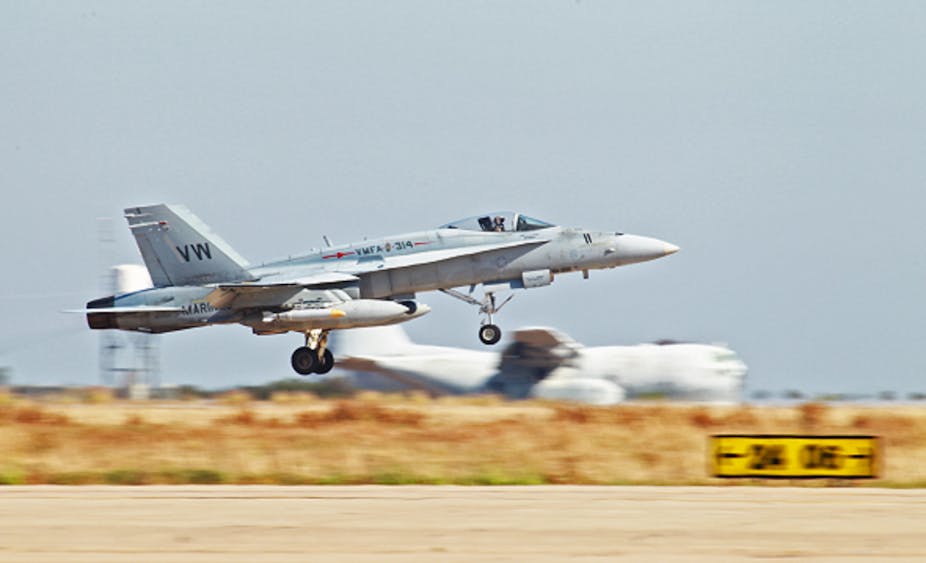As the Islamic State (IS) continues its seemingly unstoppable march across Iraq it advertises its unique anti-Christian, anti-Shia, anti-everybody brand of Islam on social media as medieval barbarism meets 21st-century technology. As the nascent caliphate grabs cash, bullion and key oil and water supplies to sustain its ambitions, images of massacred Iraqi soldiers and others have crushed Iraqi military morale and fractured what little internal political cohesion there may have been.
While those brutal deaths have provoked international horror, the prospect of the genocidal killing of thousands of innocent Yazidis on a mountain top has finally prompted action.
Internally, the Iraqis are in the process of replacing the ineffectual, divisive prime minister Nouri al-Maliki with Haider al-Abadi in pursuit of greater national unity against the IS threat. Externally the US president, Barack Obama, has ordered a small-scale deployment of America’s air assets. These two events are not unconnected and it is the former that is most important.
Obama has done well to resist calls for military intervention thus far. Events over the past 13 years in Afghanistan, Iraq and Libya have highlighted the limitations of even overwhelming air power if it is not used in support of a clearly defined strategic end state.
Multiple messages
The effective use of military force supports clear political goals and sends out crucial messages on different levels to multiple audiences. IS understands this, with its propaganda pictures, videos and public statements, even if the most shrill Western advocates of “doing something” do not.
Consider the layers of dialogue Obama is undertaking with a small number of aircraft sorties.
Most importantly, the president is telling Americans that he is not countenancing a full-scale military intervention, reversing his stated aim of withdrawing US forces from Iraq. No leader of a democracy can sustain a war or military intervention without the support of its people.
To international observers, Obama is keen to demonstrate that the US will intervene in extreme situations to stop genocide: it has not fully retreated behind its borders.

National leaders in surrounding states are being left in no doubt that Washington sees IS as a regional problem and will not sacrifice its blood and treasure in the short term only to be told that their presence, policies and decadent Western influence is not welcome in the medium to long term.
Then there is Iraq. A few air drops by C-17 and C-130 cargo aircraft cannot deliver sufficient aid to relieve the suffering of the thousands who are desperate and afraid. What they do offer is a measure of hope for the future and a reassurance that they have not been abandoned to their fate. The limited supply of food, water, tents and medication also tells the Iraqi government in Baghdad that it will have to get organised and provide effective leadership against an existential threat.
In addition, the small number of air-to-ground strikes by F/A-18s tells the Iraqi leadership, army and citizens: unite under a new, inclusive prime minister, regroup your forces, and US air support will help you to fight your way out of this situation.
Boots on the ground
However, as the Pentagon has acknowledged, air strikes on their own cannot do any more than momentarily disrupt the advance of IS fighters and even then only where they are out in the open. It will take soldiers on the ground to regain every yard of lost territory and those soldiers must be Iraqis if a peaceful, stable future is to be achieved. Even then, the price of defeating IS might be the arming of the Kurdish Peshmerga and the promise of further, or total, independence in the future – with all the ramifications that would entail.
As the IS fighters occupy towns, villages and even major cities, immersing themselves among the local populations, the advantages of air strikes – precision, reach, overwhelming force – almost disappear because of the risk of collateral damage to innocent civilians. The risk, instead, would shift to the side of the US and any allies who get involved. Newspapers and media outlets currently calling for military intervention would soon publish images of dead civilians and demand to know where it all went wrong. That is not air power gone wrong. That is what happens when air power is used against fighters located in civilian areas. IS will be watching Gaza and learning crucial lessons.
If local basing is available, American Predator and Reaper drones could operate above any Stinger missile threat to provide essential ISR – intelligence, surveillance, reconnaissance – to an Iraqi ground force counter-offensive, as well as precise, low-yield missile capabilities. In turn, the F/A-18s of the USS George H W Bush carrier fleet alone can provide heavier attack capabilities when required.
Ultimately, US air power can buy time to galvanise and organise an Iraqi ground force. It should be possible for the demoralised Iraqi army to regain its fighting spirit if the soldiers’ families and communities are threatened with barbarism of the highest order and they are presented with overwhelming air support. But the politics are simple, President Obama and the US will not, and should not, do the fighting for them.

